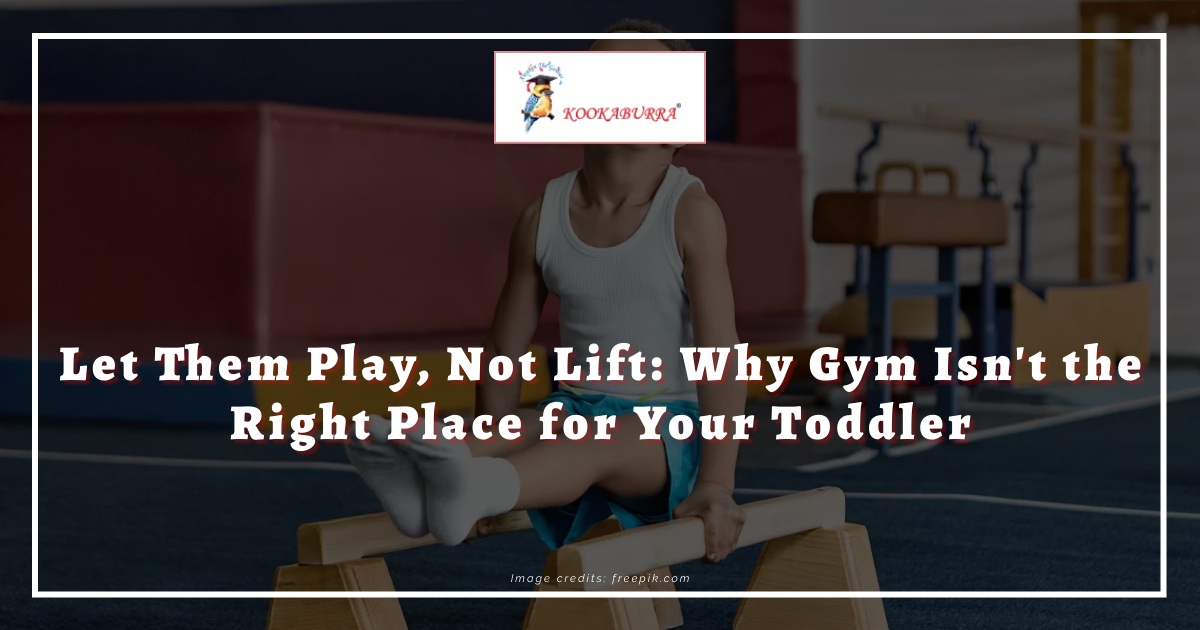
LET THEM PLAY, NOT LIFT: WHY GYM ISN’T THE RIGHT PLACE FOR YOUR TODDLERS
Today’s modern parents often get confused answering this question, should I engage my toddler in gym activities before the age of 5?
The idea of toddlers hitting the gym might sound appealing to most parents, thinking it could foster physical development in childhood. However, it’s vital to understand that age-appropriate activities are important for a child’s overall growth and development.
Early Gym Activities: A Potential Setback
Enrolling toddlers in gym classes might seem like a proactive step, but it can have its own set of dramatic drawbacks. Let’s begin with understanding children and their growth patterns. Children between the ages of 1 to 5 are in a critical phase of physical and cognitive development. Their bodies are growing rapidly, and their brains are absorbing vast amounts of information. Introducing them to structured gym activities too early might overwhelm their senses and hinder their natural developmental processes.
Drawbacks of Toddlers Doing Gym Before 5 Years
Physical Strain: Toddlers who engage in gym activities like weight lifting and endurance training at the age of 3-4 develop muscles and bones that are not ready for the strain in a formal gym exercise setup. Intense physical activities designed for older children or adults can lead to injuries in toddlers.
Cognitive Overload: Gym activities often involve following instructions, coordinating movements, and spatial awareness. Toddlers might find it challenging to grasp these concepts, leading to frustration and elevated stress.
Limited Social Interaction: Preschoolers learn a great deal from interacting with their peers. In a formal gym setting, the focus can shift towards individual performance, limiting the social interaction that is essential for their emotional and social development.
Reduced Playtime: Play is the primary way toddlers learn about the world. Structured gym activities might take away precious playtime, hindering their creativity and imagination.
Pressure to Perform: Gym classes might inadvertently create pressure on toddlers to perform well, leading to unnecessary stress. It’s most evident that kids as young as 3 and 4 years are under tremendous pressure to perform in sports like tennis, table tennis, football and many more sports elevating stress and affecting the mental wellbeing of a child. It is crucial to let them explore physical activities at their own pace without the fear of judgment or competition.
So every parent’s next question is, So what do we do?
Where will my little one get some physical playtime?
Here are some Age-Appropriate Alternatives: Activities like crawling, climbing, walking, running, and exploring their surroundings help them develop essential fine motor skills activities naturally. Playgrounds with safe equipment, toys that encourage movement, and interactive games can provide the necessary physical stimulation while fostering their love for movement and exploration.
The last question in your mind would be, How old is old enough?
A younger child may be able to do exercises that use the body’s own weight. These include push-ups and sit-ups. These should be introduced only when the child is old enough to follow directions and perform them maintaining the right form to avoid injuries.
As per Standford Medicine and children’s health, a child of 7 or 8 years may be old enough to use free weights but it’s definitely not a good idea to introduce external weights.
Ref source: https://www.stanfordchildrens.org/en/topic/default?id=weight-room-no-longer-off-limits-to-kids-1-1187
A quick wrap-up:
While the idea of toddlers in the gym might seem tempting, it’s essential to prioritize age-appropriate activities that align with your child’s developmental milestones. Encouraging natural movement, exploration, and play ensures their physical well-being and additionally nurtures their cognitive and social development. By providing a supportive environment that allows toddlers to learn and grow at their own pace, parents and educators can lay a strong foundation for a child’s future physical and mental health.
